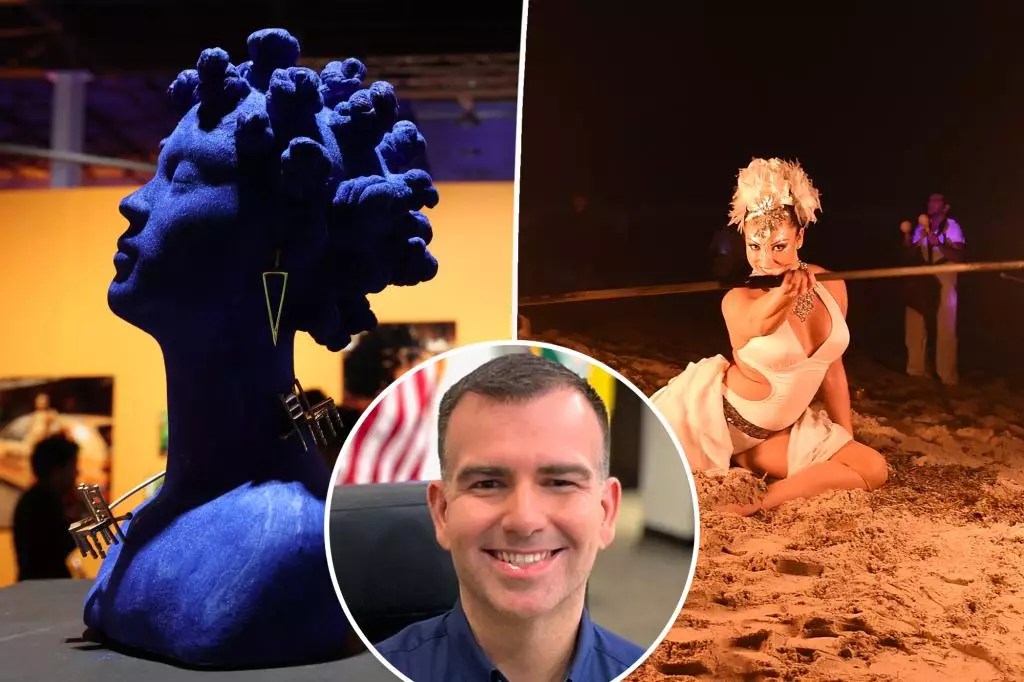As Miami Beach gears up for its annual showcase of art and culture, a seismic clash is brewing between the elite social circle of the city and local government authorities. The buzz on the streets is not just about the glittering artworks showcased during Art Basel, but rather the opulent parties that are synonymous with this period. The city’s recent crackdown on extravagant, commercial-grade gatherings has triggered a fierce backlash from wealthy homeowners who consider these opulent soirées critical to their social standing and community identity.
A Legal Challenge from Wealthy Hosts
In an unexpected turn of events, three affluent homeowners, including celebrity plastic surgeon Leonard Hochstein and prominent business figures like Farmasi CEO Sinan Tuna, have united to challenge the city’s newly enacted regulations. This significant legal action aims to preserve their lavish celebrations, which are integral to their lives, particularly during the coveted Art Week. These affluent residents have filed for an emergency injunction against a resolution that mandates large event hosts to secure permits, failing which they could face severe penalties, including potential arrest.
Coming together as a formidable trio, the plaintiffs argue that they have historically invested considerable sums—nearly $4 million collectively—into their annual celebrations. Hochstein alone is reported to have spent $300,000 on his parties, while Tuna has put forth a staggering $1.7 million. They contend that the new legislation is not just abrupt, but also legally questionable, lacking proper implementation and notice, effectively putting their plans in jeopardy.
On the opposing side of this extravagant showdown stands Miami Beach Vice Mayor Alex Fernandez, who has unequivocally supported the new regulations. Fernandez asserts that the initiative is essential for the preservation of public safety and the quality of life for residents inconvenienced by the noise and chaos associated with these large gatherings. He emphasizes that the shift toward regulation is a necessary step in ensuring that the right balance between revelry and residential peace is maintained.
Fernandez’s remarks paint a clear picture of the government’s intention: these regulations are not meant to eliminate parties outright, but to foster a controlled environment that does not infringe upon the community’s daily functioning. The plans to observe standardized safety measures are designed to mitigate issues that have plagued residents, such as obstructed emergency vehicles and overwhelming noise disturbances.
The festivities surrounding Art Basel have often led to over-the-top celebrations, transforming quiet enclaves into bustling party hubs. Residents have expressed growing frustration over the disruption caused by these extravagant festivities. Incidents of unruly guests and loud parties have amplified complaints, culminating in the city’s recent resolution aimed at curtailing unregulated events.
High-profile incidents have contributed to this urgency for regulation. The narrative of chaotic gatherings is not new; previous Art Basel parties have seen gate-crashers and unforeseen disturbances, creating havoc for both the hosts and neighboring residents. In response to such scenarios, Fernandez articulated a vision that supports sanctioned celebrations held at appropriate venues—balancing the excitement of Art Basel with the tranquility of the community.
As the court date looms, both sides demonstrate unwavering resolve in defending their positions. While the wealthy homeowners focus on the financial and social stakes tied to their festivities, the city stands firm on its commitment to ensuring that celebrations do not translate into chaos. The underlying tension is emblematic of a broader debate regarding wealth, privilege, and community dynamics in urban settings.
The opposing views about large-scale parties encapsulate more than just a simple disagreement over noise and permits; they unveil a cultural dialogue about what it means to live in a space shared with contradictions. As Miami Beach wrestles with maintaining its reputation as a vibrant cultural hub while addressing the needs of its residents, the outcome of this contentious clash may reshape the city’s festive landscape for years to come.
In the end, the pivotal question remains whether Miami Beach can foster a celebratory spirit that embraces both the glitz of high society and the essential need for community stability. The ongoing legal battle is a reflection of this effort—a quest for balanced coexistence between raucous celebrations and neighborly peace. As Miami Beach approaches the heart of its social calendar, the outcome could redefine how luxury celebrations are conducted amid the backdrop of a bustling metropolis. The stakeholders involved must navigate these challenging waters to strike a harmonious chord that respects both extravagant tradition and the everyday lives of its residents.


Leave a Reply